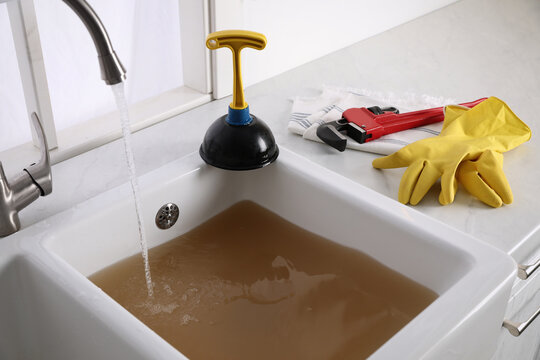Mastering Plungers and Drain Cleaners: Essential Tips
Mastering Plungers and Drain Cleaners: Essential Tips
Blog Article
Any individual maintains their unique way of thinking about Here's How to Correctly Use a Toilet Plunger.

Intro
Appropriate maintenance of household drains pipes is vital for stopping blockages and making sure smooth water flow. Among the key tools in every property owner's toolkit is the plunger, along with numerous drain cleaners developed to tackle stubborn obstructions properly. This post explores exactly how to use plungers and drain cleansers efficiently to maintain your drains pipes flowing easily.
Area 1: Recognizing Plungers
Sorts of Plungers
There are several types of bettors readily available, each designed for different sorts of drains and blocks. The most typical types include cup plungers, flange plungers, and accordion plungers.
Exactly How Plungers Work
Bettors work with the concept of creating pressure and suction to dislodge clogs. When appropriately used over a drain, they produce a vacuum that can pull out particles or separate obstructions.
Selecting the Right Bettor
Picking the appropriate bettor relies on the type of drainpipe and the nature of the obstruction. Mug plungers are perfect for sinks and tubs, while flange bettors are better suited for commodes because of their design.
Usual Errors with Bettors
Preventing these mistakes ensures reliable plunging: incorrect seal around the drain, inadequate force, and not clearing bordering particles.
Section 2: Using Plungers Successfully
Preparation
Prior to plunging, make sure the bettor covers the drain totally and creates a tight seal. Clear any type of noticeable debris around the drainpipe opening.
Technique
Begin with mild plunging movements to construct suction. Boost pressure progressively, utilizing a steady rhythm. Repeat as needed until the drain gets rid of.
Repairing Tips
If diving doesn't work, attempt adjusting the seal, using oil jelly for a better seal, or utilizing a different type of bettor.
Area 3: Comprehending Drain Cleaners
Sorts Of Drain Cleaners
Drain pipes cleaners can be chemical or chemical. Chemical cleansers utilize strong chemicals to liquify clogs, while chemical cleansers use natural enzymes to break down raw material.
Just How Drain Cleaning Company Work
Chemical cleaners react with obstructions to dissolve them, while enzymatic cleansers break down natural products like hair and grease without hurting pipelines.
Safety and security Considerations
Always wear gloves and eye security when utilizing chemical drain cleansers. Make certain appropriate ventilation and adhere to producer guidelines very carefully.
Eco-Friendly Alternatives
Consider utilizing vinegar and cooking soda or enzyme-based cleaners for green options that are much safer for pipes and the atmosphere.
Section 4: Utilizing Drain Cleaners Successfully
Application Strategies
Put chemical cleansers directly into the drain opening. Enable them to help the recommended time prior to flushing with hot water. Chemical cleansers must sit overnight.
Precautions
Stay clear of mixing different kinds of cleaners, as this can generate hazardous fumes. Never utilize chemical cleaners along with a bettor, as splashing can take place.
Dealing With Persistent Clogs
For relentless clogs, take into consideration using a pipes snake or calling an expert plumbing professional to avoid damages to pipelines.
Conclusion
To conclude, recognizing exactly how to make use of plungers and drainpipe cleaners effectively is crucial for preserving healthy plumbing systems. By picking the right tools and methods, homeowners can deal with small clogs and avoid significant pipes concerns down the line.
How To Properly Use A Plumbing Snake To Clear Drains
When any drain clogs in our home arise, we tend to gravitate toward the plunger and little else. In cases where the plunger and its vacuum-created pressure are not able to clear clogs, many immediately move to harmful chemicals or simply call their plumber to fix the issue.
we’re happy to help with all drain cleaning needs and concerns. This includes informing you on a few other home remedies you may have at your disposal for minor to moderate clogs, one of which is the use of a plumbing snake. Many people have never used one of these before – let’s go over the steps to take when your drain clogs and you have a plumbing snake available.
Attempt Plunger Use
The first step here, as we noted above, should indeed be to grab your plunger when you notice a drain clog and attempt to resolve it this way. If you’re unsure how to use a particular type of plunger, our plumbers can answer any questions you have. If this doesn’t do the trick, however, you move on to the snake.
Locate And Prepare Snake
A plumbing snake is a metal or plastic device that’s generally about a quarter of an inch thick. It’s design with significant extensions, meant to reach down into your clogged drain and push the clog out. Snakes also contain drain augers that will latch onto and push stubborn blockages.
If your plunger doesn’t clear a clog, locate your snake and bring it to the drain in question. We also recommend keeping a bucket nearby to collect the clog once you pull it out, plus we’d advise wearing goggles and possibly protective gloves.
Feed Snake
Once you’re ready to go, feed the snake slowly down the drain, using the crank device it comes with to keep it moving until it finds the clog. Once this happens, much of the clog will be latched onto the coil so you can pull it out, while the rest will simply break up and flow downward.
Detach Debris
Remove the snake slowly from the drain, and once you’ve done so, pick off any debris that’s stuck to the coil. This is another area where wearing gloves is a must.
Flush Drain
Finally, take a few minutes to ensure the snake has done its job correctly. If you’ve been using it on a toilet, flush the toilet a couple times and make sure everything flows well. If you’ve used it on a different drain, flush it with some room temperature water.
https://www.mybuddytheplumber.com/blog/how-to-properly-use-a-plumbing-snake-to-clear-drains/

Application Strategies
Put chemical cleansers directly into the drain opening. Enable them to help the recommended time prior to flushing with hot water. Chemical cleansers must sit overnight.
Precautions
Stay clear of mixing different kinds of cleaners, as this can generate hazardous fumes. Never utilize chemical cleaners along with a bettor, as splashing can take place.
Dealing With Persistent Clogs
For relentless clogs, take into consideration using a pipes snake or calling an expert plumbing professional to avoid damages to pipelines.
Conclusion
To conclude, recognizing exactly how to make use of plungers and drainpipe cleaners effectively is crucial for preserving healthy plumbing systems. By picking the right tools and methods, homeowners can deal with small clogs and avoid significant pipes concerns down the line.
How To Properly Use A Plumbing Snake To Clear Drains
When any drain clogs in our home arise, we tend to gravitate toward the plunger and little else. In cases where the plunger and its vacuum-created pressure are not able to clear clogs, many immediately move to harmful chemicals or simply call their plumber to fix the issue.
we’re happy to help with all drain cleaning needs and concerns. This includes informing you on a few other home remedies you may have at your disposal for minor to moderate clogs, one of which is the use of a plumbing snake. Many people have never used one of these before – let’s go over the steps to take when your drain clogs and you have a plumbing snake available.
Attempt Plunger Use
The first step here, as we noted above, should indeed be to grab your plunger when you notice a drain clog and attempt to resolve it this way. If you’re unsure how to use a particular type of plunger, our plumbers can answer any questions you have. If this doesn’t do the trick, however, you move on to the snake.
Locate And Prepare Snake
A plumbing snake is a metal or plastic device that’s generally about a quarter of an inch thick. It’s design with significant extensions, meant to reach down into your clogged drain and push the clog out. Snakes also contain drain augers that will latch onto and push stubborn blockages.
If your plunger doesn’t clear a clog, locate your snake and bring it to the drain in question. We also recommend keeping a bucket nearby to collect the clog once you pull it out, plus we’d advise wearing goggles and possibly protective gloves.
Feed Snake
Once you’re ready to go, feed the snake slowly down the drain, using the crank device it comes with to keep it moving until it finds the clog. Once this happens, much of the clog will be latched onto the coil so you can pull it out, while the rest will simply break up and flow downward.
Detach Debris
Remove the snake slowly from the drain, and once you’ve done so, pick off any debris that’s stuck to the coil. This is another area where wearing gloves is a must.
Flush Drain
Finally, take a few minutes to ensure the snake has done its job correctly. If you’ve been using it on a toilet, flush the toilet a couple times and make sure everything flows well. If you’ve used it on a different drain, flush it with some room temperature water.
https://www.mybuddytheplumber.com/blog/how-to-properly-use-a-plumbing-snake-to-clear-drains/

I'm very serious about Here's How to Correctly Use a Toilet Plunger and I'm hoping you appreciated the entire blog posting. Don't hesitate to take a moment to distribute this content if you enjoyed it. Thank you so much for taking the time to read it.
Find Out More Report this page